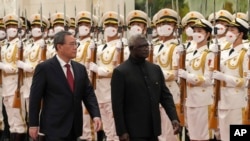China’s growing security presence in the Pacific will be scrutinized this week as the Solomon Islands holds its national election on Wednesday. While the Pacific island nation has been plagued by a slew of domestic issues such as youth unemployment and weakening health and education systems, some analysts say the election is a “de-facto referendum” on its relationship with China.
“The results will determine whether the Solomon Islands continues growing its relationship with China or changes course in favor of a different approach,” Parker Novak, a nonresident fellow at the Atlantic Council's Global China Hub, told VOA in a written response.
Solomon Islands Prime Minister Manasseh Sogavare, who seeks an unprecedented second consecutive term, has focused on deepening the country’s ties with China since he returned to power in 2019.
After switching Solomon Islands’ diplomatic recognition from Taiwan to China in 2019, Sogavare signed a series of security-related agreements with China, including a security pact in 2022 and a police cooperation agreement in 2023.
The developments prompted the U.S., Australia and other Pacific island nations to express concerns about the security implications of these deals. So far, the Solomon Islands hasn’t revealed details of the controversial security pact with China.
However, a leaked draft agreement shows that China could potentially deploy security and naval assets to the country.
The lack of transparency around the security deal with China has prompted several opposition candidates in the Solomon Islands to vow to abolish or review the security pact.
While opposition leaders have sounded the alarm about China’s growing security presence in the Solomon Islands, Sogavare has strongly defended his administration’s efforts to deepen bilateral ties with China.
Centering his campaign around his signature “Look North strategy,” which aims to consolidate Solomon Islands’ economic and diplomatic ties with Asian countries, Sogavare has repeatedly emphasized how Chinese support with infrastructure developments and the Pacific Games has helped place the Pacific island nation “in a more favorable footing domestically and internationally.”
In response to opposition politicians’ concerns about China’s growing influence over the Solomon Islands, China’s Foreign Ministry said Monday that Beijing supports the people of Solomon Islands “in choosing a development path that suits their national conditions.”
Some experts say China’s entry into the Solomon Islands’ security sector in recent years has created friction with traditional security partners like Australia. “There has been an increase in friction as a result of China’s entry into the security space in the Solomon Islands and other parts of the Pacific,” said Mihai Sora, a research fellow in the Pacific Islands program at Lowy Institute in Australia.
While the Solomon Islands is trying to retain relationships with partners like Australia amid its efforts to deepen ties with China, Sora said the Sogavare administration’s attempt will be difficult to execute because of continuing “strategic friction” between Beijing and Canberra, especially in the security space. [The Solomon Islands] “will need to resolve the increasing frictions,” he told VOA by phone.
Chinese security presence in the Pacific comes into focus
In addition to the Solomon Islands, China’s growing security presence in other parts of the Pacific region is also coming under scrutiny ahead of other major political events. Earlier this month, Tonga’s Prime Minister Siaosi Sovaleni said he would be open to accepting Chinese security support when the country hosts the Pacific Islands Forum in August.
“There’s no reason to be concerned. China is offering to assist with the hosting of the foreign leaders' meeting,” he told reporters in the Tongan capital Nukuʻalofa.
The Chinese Embassy in Tonga told AFP in a statement that Beijing “has no interest in geopolitical competition or seeking the so-called 'sphere of influence.’”
Some analysts say Tonga’s decision to welcome China as a potential security provider reflects Pacific island nations’ efforts to diversify their security partners since 2021.
“China has had success in presenting itself as a security stakeholder in the region and this is certainly of concern to Canberra, Wellington and Washington, who view China’s security interests in the Pacific as disruptive and indicative of China’s broader interests,” Anna Powles, an associate professor in security studies at Massey University in New Zealand, told VOA in a written response.
Meanwhile, Fiji’s Prime Minister Sitiveni Rabuka told ABC Australia in March that the country has removed Chinese police embedded in its police force despite the earlier decision to uphold Fiji’s policing cooperation agreement with China.
Some experts say Fiji is “walking a fine line” in its relationship with China and Western countries. “By not throwing away the police deal, Fiji is showing that they are not willing to go all in and align with the West,” Michael Walsh, an affiliated researcher at the Georgetown School of Foreign Service, told VOA by phone.
In his view, Fiji’s careful calibration of its security relationship with China demonstrates that “they are going to keep having a relationship with China that extends into the security domain for the foreseeable future.”
While some experts agree that China has made progress in expanding its security presence in the Pacific, Novak from the Atlantic Council said Beijing’s security influence in the region “shouldn’t be overstated.”
“More often than not, Pacific islands countries have elected to maintain or even grow traditional security partnerships with countries like Australia, New Zealand and the United States while carefully maintaining their own sovereignty,” he told VOA.









